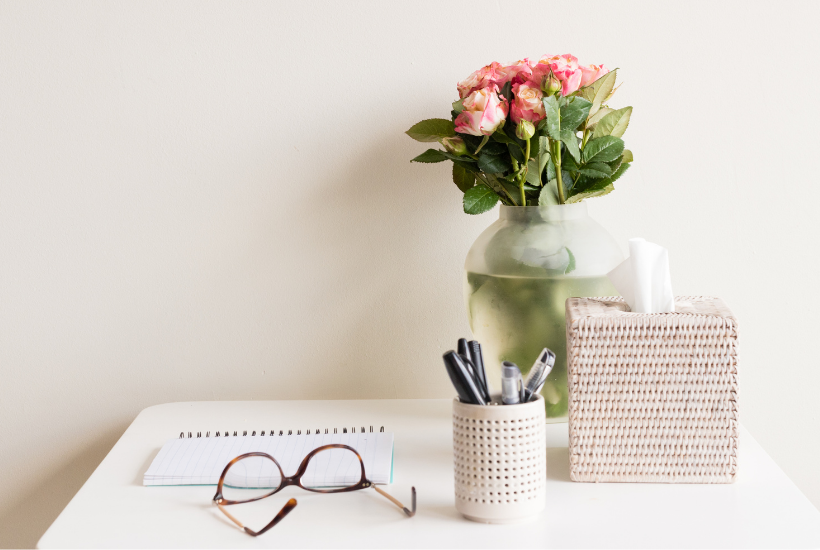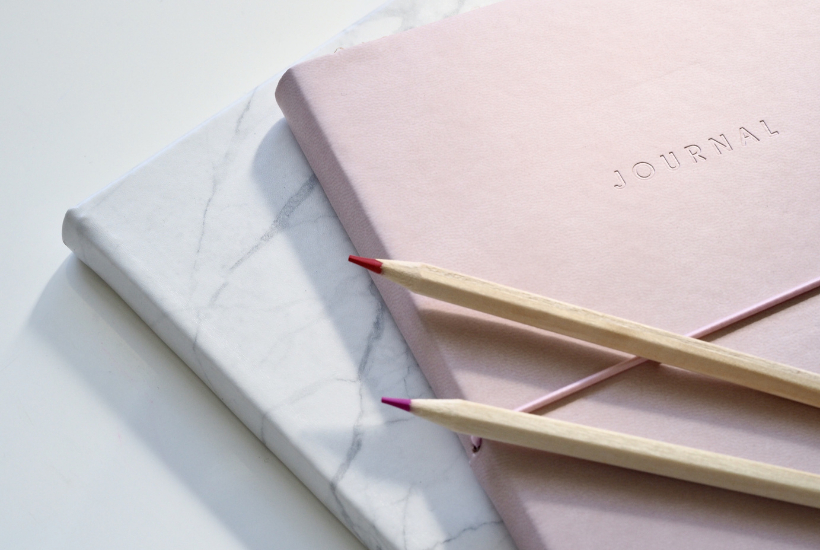For many people keeping a journal is a welcomed idea, but when it comes to journaling ideas they wind up feeling stuck. Maybe that’s you. Or perhaps you kept a journal in the past but fell out of the habit. If you’ve thought about keeping a journal but don’t know where to start, or you simply want to get back to journaling, then keep reading.

Before we get into the journaling ideas, I want to tackle a few reservations that keep many of us from getting started with journaling in the first place.
Roadblocks to Journaling
I’m not comfortable sharing my thoughts
The first thing to keep in mind is that journaling is just for you. While it can be helpful to share your thoughts and what you’ve uncovered in your journaling time with a coach, mentor or health care provider, it’s important to be free of any judgement. If you think you’re writing for someone else’s eyes, you’ll likely overthink it or censor your writing. Write just for you.
What if I do it wrong?
There’s no wrong way to journal. Bullet points, long flowing paragraphs, poems, you name it, these are all forms of journaling. You don’t have to fix your grammar, spellcheck, or edit for word count. Just write freely.

I don’t know if I can keep up with it
Right now, just focus on getting started. Yes, it’s true that journaling is more effective when done regularly but the good news is the more you write, the more comfortable you’ll become with the process. And as you experience the benefits along the way, you might even get hooked on this journaling thing. So just start.
I don’t have the time
Sure, you do. We always make time for the things that are important to us. Don’t overthink it. All you need is 10-20 minutes a day. Plus, how long you write is not as important as what you write. Make a commitment to yourself and just use whatever little time you have and get started.

Oh, and by the way, if you’re looking for journaling ideas because you want to heal from, cope with or adjust to a traumatic event, seek the assistance of a mental health professional. If you’re not sure where to get help ask your primary care physician, pastor or spiritual director.
Okay, now that we’ve gotten some of the roadblocks out of the way, let’s jump into some journal writing ideas to get you started.
These journaling ideas are perfect if you don't know what to write or have let go of your journaling habit. Just start here. Share on XJournal Writing for Your Best Life
Now that you’ve decided to start a journal you’re wondering what exactly you should write about. Once again, there’s no right or wrong when it comes to journaling, so here are a few ideas to get you started.
Write about your day – this is often an easy place to start. As you recall the events in your day, you may also wish to write about how you felt about what happened.
Write about your worries – what are the things that are keeping you up at night? Write about those things. You may find that just writing them down helps you to gain another perspective or to put your finger on what’s really bothering you.
Write about your past – this is especially helpful for processing difficult experiences. If you’ve been through a particularly traumatic experience, consider going through this process with the support of a mental health professional.
Write about your goals – journaling about your goals is a great way to start envisioning what’s possible. As you write about your dreams and goals and begin to think through how you will get there you can start making steps towards achieving them.
7 Journaling Ideas to Try Right Now

Some people choose to have a journal where they write everything that comes to their minds but there are those who journal for very specific purposes. Since this article is about journaling ideas, let’s look at a few types of journals that might work for you based on your individual goals for your best life. Feel free to try any of these ideas by themselves or combine more than one to create your ideal journal.
Journaling for your physical health:
1. Exercise/health journal – keep track of your physical activity such as your exercise routine. What have you noticed that’s working (or not)? How do you see your overall health improving?
2. Food journal – use this journal to keep track of what you eat each day. From there you could count calories, check how balanced your meals are, or even share your thoughts about what you ate and why, helping you journal your way to better choices.

Journaling for your emotional health:
3. Classic journal – this is a journal where you reflect on your day’s events and write whatever comes to mind. It’s a helpful way to take note of your feelings and help you start to process what’s going on in your head and heart.
Journaling for your spiritual health:
4. Devotional journal – write about what you’re learning about God and what He’s teaching you. Here you can explore various passages of Scripture or share your reflections from sermons.
5. Prayer journal – this is a fantastic way to document your prayers and circle back to them as you see them getting answered.
Journaling for your overall wellbeing:
6. Vision journal – like a vision board, this is another way of setting out your goals. Feel free to get creative with this one by including words, pictures, drawings, etc.
7. Gratitude journal – share the things you’re grateful for, big and small. No matter how ‘bad’ your day might be, this trains your mind to look for the ‘good’ and is the ideal journal to write in every day.

How about you?
Now that we’ve covered some journaling basics and shared a few ideas to get you started what type of journal will you choose? Whichever one you pick, every word you write will move you closer to your goal of better health and help you become more resilient in facing life’s challenges. Just keep writing.
Are you Living your best life? Take the THRIVE 5-Day Challenge and find out.


So many fabulous ideas! I have a very “no pressure” approach to my journaling… sometimes I take thoughts and use them later on in my actual writing and sometimes it’s just for me and to get my writing muscles warmed up. But it’s always a good practice! Thanks for sharing. 🤗
Laura, I’m happy to hear how you use journaling as an author — it reminds me to just keep writing! Thanks for getting the conversation started.
Blessings to you!